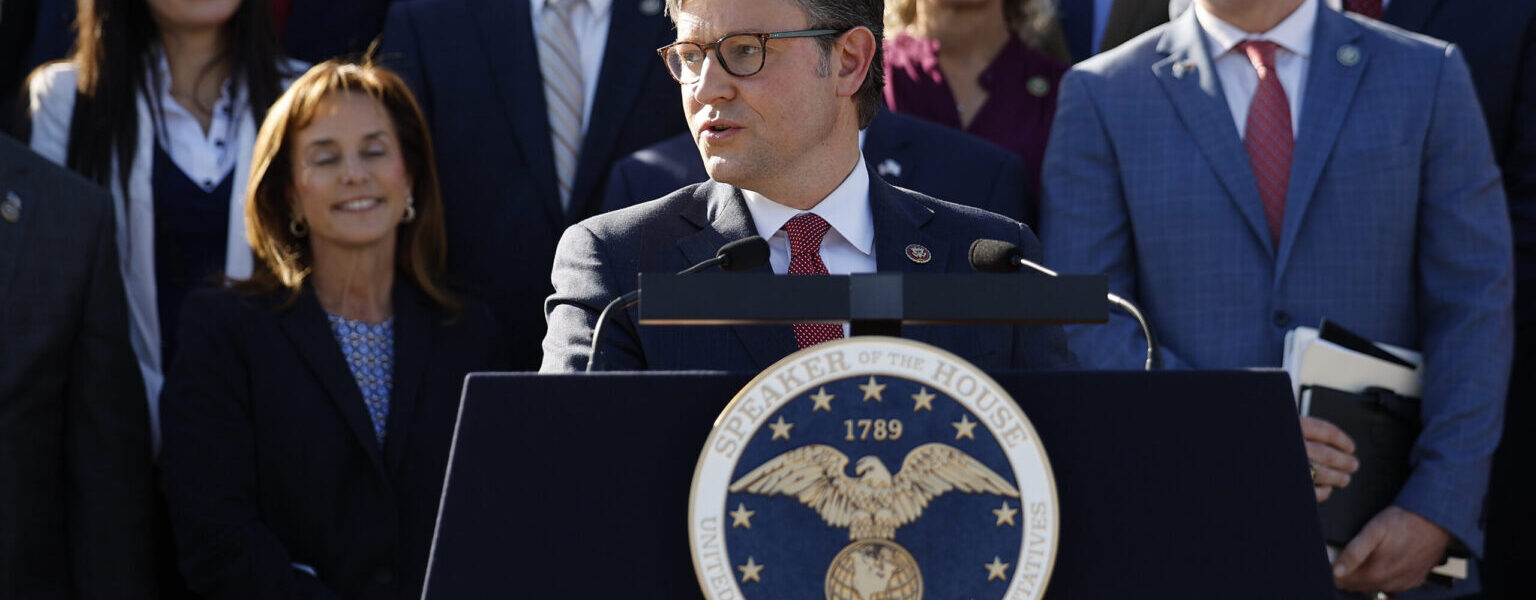On November 13, the House will discuss a stopgap funding package to prevent a government shutdown.
In the Washington Speaker Mike Johnson’s plan to prevent a government shutdown is scheduled to be discussed by the House in Tuesday, according to a letter sent to members late on Monday night.
Under a process known as suspension of the rules, the continuing resolution—a temporary measure to temporarily finance the government—will be brought to the House floor. This saves the bill from going to the House Rules Committee, which Republicans had threatened to kill it. There are some restrictions when it comes to the bill that is on suspension: it cannot be changed and needs a two-thirds majority to pass the House.
Former Speaker Kevin McCarthy used this strategy for the final continuing resolution in late September. The strategy worked to save the government from shutting down, as all of the House’s Democrats supported the measure. However, it lost McCarthy the speakership when Rep. Matt Gaetz proposed a vote of no confidence in him.
Similar to McCarthy, Johnson will need Democrats’ support to pass the interim legislation, but because he hasn’t had much time as speaker, there hasn’t been any indication yet that Republicans will move quickly to remove Johnson, as they did McCarthy.
Johnson announced his temporary measure on Saturday, which would fund certain federal departments at current levels through January 19 and support others through February 2. Not only does it not contain the deep budget cutbacks that conservatives have wanted, but it also does not support Israel, the southern border, or Ukraine.
Regarding the two-step plan, the Louisiana Republican declared, “The bill will stop the absurd holiday-season comprehensive tradition of massive, loaded-up spending bills introduced right before the Christmas recess.”
The House Rules Committee met Monday afternoon with the intention of discussing the issue, but was unable to establish a rule that would have permitted the bill to be addressed on the floor. One of the first Republican members of the committee to publicly oppose Johnson’s idea was Rep. Chip Roy of Texas.
“If we are actually achieving ‘wins’ on… anything, I’m willing to accept a brief extension. albeit not only a punt,” he penned before to the committee meeting.
Along with Roy, other Republican opponents of the bill include Reps. Scott Perry of Pennsylvania, George Santos of New York, Bob Good of Virginia, Marjorie Taylor Greene of Georgia, and Warren Davidson of Ohio. Johnson will thus require Democratic cooperation in order to pass the measure if they all vote against it.
Before the new fiscal year begins on October 1, Congress has to pass twelve appropriations bills to fund numerous national government agencies for an extra year. The measures are sometimes combined to form one huge one known as a “omnibus” bill.
There are seven legislation that the House has passed and three that the Senate passed as part of a “minibus.” Not a single one has survived both chambers.

Only hours before a government shutdown was scheduled to begin in September, Congress enacted a last-minute agreement to keep the government running till mid-November.
Hard-right members, who wanted the House to consider individual budget measures instead of a short-term extension that financed the government at existing levels, were incensed by the bipartisan agreement. After House Speaker Kevin McCarthy was removed by his opponents, the lower house was unable to move any legislation for three weeks because Republicans could not agree on a replacement.
Republicans were thinking of a fresh strategy to temporarily finance the government, Johnson said earlier this month, acknowledging that there was “a growing recognition” that another stopgap budget package, known as a continuing resolution, is required to prevent a government shutdown.
He referred to the plan as a “laddered” continuing resolution as it would include several appropriations bills with different expenditure caps. The package he unveiled on Saturday keeps funds for energy, housing, transportation, agriculture, and veterans’ programs open until January 19. Through February 2, money for the defense department and the other eight appropriations bills would be provided.
Hakeem Jeffries, the minority leader in the house from New York, referred to the “laddered” strategy as a “nonstarter” last week. Nonetheless, Democrats find the package more palatable because it does not include modifications or budget cutbacks. Such a move, in Jeffries’ opinion, “is the only way forwards.”
A Saturday statement from the White House denouncing the bill as a “unserious proposal” refrained from threatening a veto. In the event that it passes Congress, President Biden said on Monday that he could be willing to sign it.
“I’m not going to pass a judgment as to what I’d veto and what I’d signature, let’s wait and see what they’ve comes up with,” Biden said to the media.
Democrats in the Senate have mostly refrained from criticizing it. On Monday, Senate Majority Leader Charles Schumer described the package as “far from perfect,” but noted that the “most important thing” is that it does not involve drastic cutbacks, and the February extension includes defense budget.
The Senate postponed the procedural vote on the legislative vehicle for its short-term funding extension that was scheduled for Monday night.
Regarding the delay, Schumer said, “We are pausing on the plans for moving forward on the Senate vehicle to allow the House can move first with their proposal.”




